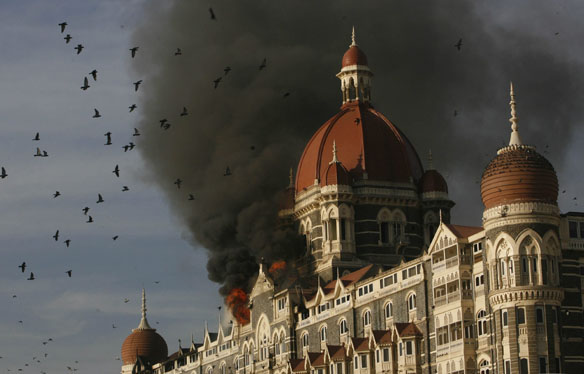Mumbai attacks spur paradigm shift in India's security
 New Delhi - India was virtually under terrorist siege all of last year, facing major attacks and bombings almost every month, leading up to the bloodbath in Mumbai in November.
New Delhi - India was virtually under terrorist siege all of last year, facing major attacks and bombings almost every month, leading up to the bloodbath in Mumbai in November.
The Mumbai attacks exposed India's undermanned and ill-equipped security apparatus and proved to be a turning point for the Indian establishment in overhauling internal security and reorienting its policy on terrorism.
India has finally woken up to the challenges of modern-day terrorism, bringing a transformation of the situation on the ground.
All through 2008, terrorists struck at will and with increasing intensity across India, claiming 400 lives, leading to national outrage and the ouster of security minister Shivraj Patil.
After the Mumbai strike by Pakistan-based militants, Indian authorities prevented other major terrorist attacks, a rare achievement for the country which has been battling cross-border terrorism for many years.
Delhi upgraded its security and intelligence apparatus and exerted diplomatic pressure on Islamabad to control anti-India militants. Internal developments in Pakistan, where the jihadists are fighting for survival, also helped.
Indians now seem more assured about tackling terrorist threats after Palaniappan Chidambaram took charge as the federal home minister, overseeing a large-scale mobilization and modernization of the forces and having instilled a sense of urgency with some swift decision-making.
"The audacity of the attacks laid bare our poor intelligence standards, unguarded coasts and vulnerable cities like Mumbai where police with antiquated .303 rifles fought terrorists armed with automatic weapons," said a senior Home Ministry official requesting anonymity.
Following the attacks, India implemented an action plan on internal security that saw the establishment of a National Investigation Agency to probe terrorism cases and ensured greater cooperation among intelligence agencies.
Four new anti-terror National Security Guard hubs were created and there are plans to set up a unified coastal command and a dedicated counter-terrorism centre.
Deputy Home Minister Ajay Maken said the thrust is on prevention of attacks by gearing up the intelligence machinery, intelligence sharing and operational coordination between agencies.
With the Prevention of Unlawful Activities Act, anti-terrorism legislation has been tightened.
The government is slated to spend between 2 to 4 billion dollars on arms and equipment for the protection of India's coastline, borders, airports and mass-transport systems, local media reported.
India is already modernizing its defence forces, and acquisitions are to double to 30 billion dollars by 2012.
The changes are visible in Mumbai with CCTV cameras and metal detectors at crowded places, bullet-proof vehicles, and policemen armed with new automatic weapons although there are still concerns over their training.
"No amount of security can stop suicide attackers. But we are better-armed to fight them strongly," said SK Dighe, a police officer at Mumbai's main railway station, one of last year's targets.
The Navy and Coast Guard have increased surface and air surveillance and patrols.
"After the attacks we have greater coordination with the Navy. We have set up a number of mechanisms to make sure all force is available for coastal surveillance," Vice Admiral Anil Chopra said.
So is India a safer place after 26/11, as last year's attack is known locally? The government strategy seems to have worked but there is no room for complacency as intelligence agencies uncover new terror plots.
Even Premier Singh has warned of intelligence reports of imminent attacks in the country.
Security experts said a lot needs to be done. Besides the systemic changes and the overhaul plans that have to be implemented, optimal use must be made of existing capacities.
"There is little evidence of any enduring changes in policy and approach at the level of states," said Ajai Sahni, director of Delhi's Institute of Conflict Management.
"If India is to secure effective counter-terrorism capabilities, these will have to be located in the apparatus for general policing and intelligence in the states, not concentrated in federal agencies. To the extent this is not happening, India will remain extraordinarily vulnerable to future attacks," he said.
"I'm certain we have better preparedness today. But it is not correct to expect results overnight. Although the police and paramilitary forces are not fully equipped, long-pending procurements have begun," another expert, Suvrokamal Datta, said.
Indian officials sound confident about preventing a repeat of the Mumbai attack.
The US and Indonesia have not allowed major attacks to happen after 9/11 and the Bali bombings but India has been targeted time and again, India's Army Chief General Deepak Kapoor said, adding India should show no tolerance for terror.
"The time has come for all of us to say, no more," he said. (dpa)